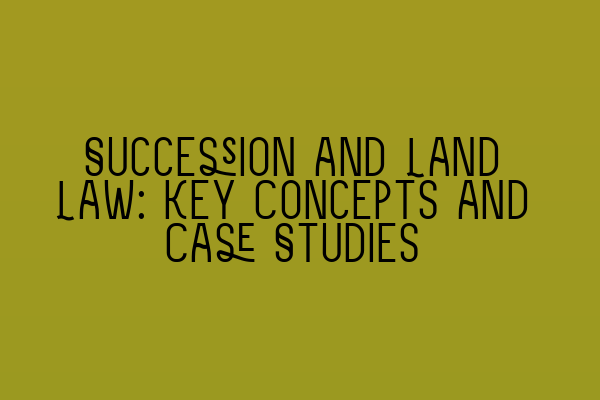Succession and Land Law: Key Concepts and Case Studies
Succession and land law are fundamental areas of property law that play a significant role in determining the transfer of property rights from one person to another. In this blog post, we will explore the key concepts and case studies related to succession and land law, providing you with a comprehensive understanding of these crucial areas of legal practice.
Succession Law: A Brief Overview
In its essence, succession law deals with the transfer of property upon the death of an individual. It encompasses various legal principles, including wills, intestacy, executorship, and administration of estates.
One of the primary focuses of succession law is the concept of a will. A will is a legal document that outlines how a person’s property and assets should be distributed after their death. It enables individuals to exercise control over their property and ensures that their wishes are respected in the event of their demise.
In cases where a person dies without a valid will, the laws of intestacy come into play. These laws determine how the deceased’s property will be distributed among their heirs, based on a predetermined order of priority. Intestacy laws vary from jurisdiction to jurisdiction, so it is essential to consult a legal expert in your specific area.
Land Law: Understanding Property Ownership and Rights
Land law, on the other hand, revolves around the legal rights and obligations associated with owning and transferring land or real property. It governs the way land can be owned, used, and transferred, and the various interests that individuals or entities can have in land.
One of the fundamental concepts in land law is the distinction between legal and equitable interests in property. Legal interests refer to the rights recognized by law, such as ownership of land. Equitable interests, on the other hand, pertain to the rights recognized by equity, which often complement or supplement legal rights.
When it comes to transferring land, land law provides various mechanisms, such as conveyancing and leases. A conveyance involves the transfer of legal title from one party to another, while a lease grants the temporary use and possession of land in exchange for rent.
To fully comprehend the complexities of land law, it is essential to analyze relevant case studies that illustrate its practical application.
Case Study: Blackacre Estate
Let’s consider a case study involving Blackacre Estate. The estate is subject to an ancestral trust, where the legal title is held by the trustee, and the equitable interest is held by a beneficiary. The trustee has the legal power to manage and possess the property, while the beneficiary has the equitable right to receive the income generated by the estate.
Over time, the beneficiary decides to transfer their equitable interest in the estate to a third party. To accomplish this, a legal document called a deed of assignment is executed, effectively transferring the equitable interest to the new owner.
However, it is crucial to note that the trustee’s legal title remains unaffected by this transfer. They continue to hold the legal rights and obligations associated with the estate.
Case Study: Tenant and Landlord Dispute
Another case study that demonstrates the workings of land law involves a tenant and landlord dispute. Let’s say a landlord leases a commercial property to a tenant for a period of ten years.
During the lease term, the tenant wishes to sell their business and transfer the leasehold interest to the new owner. This process requires obtaining the landlord’s consent and executing an assignment of lease, whereby the tenant transfers their leasehold interest to the new occupant.
However, the landlord has the right to withhold consent if certain conditions are not satisfied. For example, if the proposed new tenant does not meet the landlord’s criteria for financial stability or reputation, the landlord may refuse consent and retain the leasehold interest with the current tenant.
These case studies demonstrate the significance of understanding the intricate details of succession and land law to navigate legal complexities successfully.
Conclusion
In conclusion, succession and land law are crucial areas of property law that govern the transfer of property rights and the legal landscape surrounding land ownership and usage. Understanding the concepts and case studies related to succession and land law is essential for legal professionals and individuals alike.
Want to test your knowledge of property law? Take a look at our SQE 1 Practice Exam Questions or our SQE 1 Practice Mocks FLK1 FLK2 resources.
